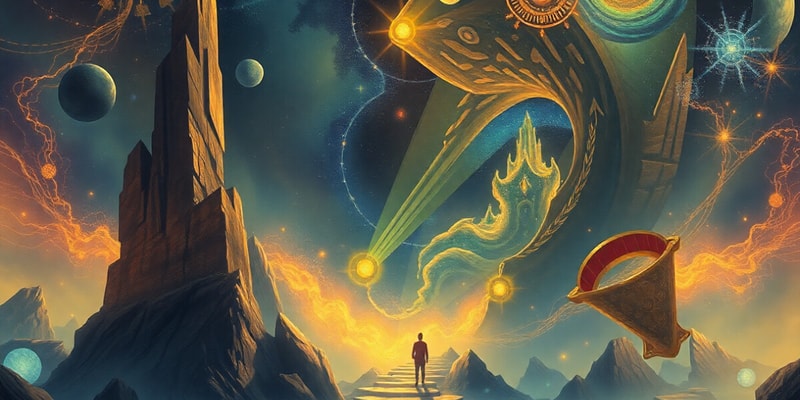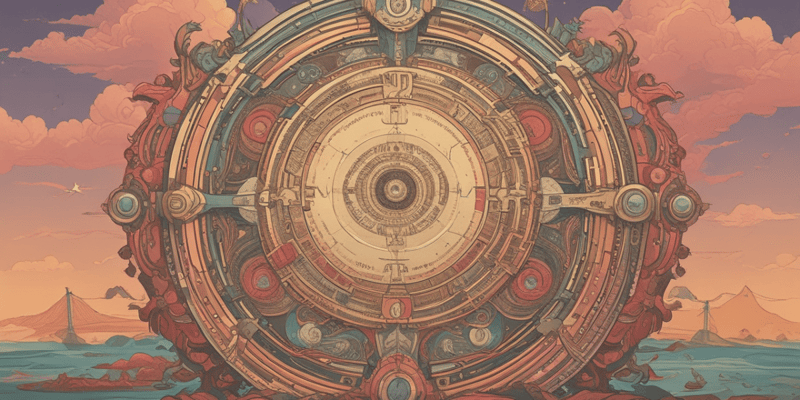Podcast
Questions and Answers
Who coined the term 'ideology'?
Who coined the term 'ideology'?
Antoine Louis Claude Destutt De Tracy
According to Francis Bacon, the purpose of knowledge is only to liberate human minds from ignorance.
According to Francis Bacon, the purpose of knowledge is only to liberate human minds from ignorance.
False
What does Mannheim suggest about ideology?
What does Mannheim suggest about ideology?
What is the main argument of David Ingersoll regarding ideology?
What is the main argument of David Ingersoll regarding ideology?
Signup and view all the answers
Which ideology advocates for a society without government?
Which ideology advocates for a society without government?
Signup and view all the answers
Absolutism supports decentralized decision-making.
Absolutism supports decentralized decision-making.
Signup and view all the answers
What does socialism promote?
What does socialism promote?
Signup and view all the answers
What is one of the central tenets of conservatism?
What is one of the central tenets of conservatism?
Signup and view all the answers
Which ideology aims to replace private property with public ownership?
Which ideology aims to replace private property with public ownership?
Signup and view all the answers
___ uses violence to achieve its goals.
___ uses violence to achieve its goals.
Signup and view all the answers
What kind of government does fascism advocate?
What kind of government does fascism advocate?
Signup and view all the answers
Who coined the term ideology?
Who coined the term ideology?
Signup and view all the answers
Francis Bacon believed that knowledge is power.
Francis Bacon believed that knowledge is power.
Signup and view all the answers
According to Marx and Engels, what is ideology?
According to Marx and Engels, what is ideology?
Signup and view all the answers
What does Mannheim suggest is necessary to understand ideology?
What does Mannheim suggest is necessary to understand ideology?
Signup and view all the answers
Which ideology is described as advocating for a society without government or authority?
Which ideology is described as advocating for a society without government or authority?
Signup and view all the answers
Which ideology prioritizes stability and order with absolute power centered in a single ruler?
Which ideology prioritizes stability and order with absolute power centered in a single ruler?
Signup and view all the answers
What does socialism promote?
What does socialism promote?
Signup and view all the answers
What distinguishes fascism from other ideologies?
What distinguishes fascism from other ideologies?
Signup and view all the answers
Totalitarianism allows for multiple political parties to exist freely.
Totalitarianism allows for multiple political parties to exist freely.
Signup and view all the answers
Match the following ideologies with their key characteristics:
Match the following ideologies with their key characteristics:
Signup and view all the answers
According to David Ingersoll, the future represents something ______ than the present.
According to David Ingersoll, the future represents something ______ than the present.
Signup and view all the answers
Study Notes
Ideologies Overview
- Antoine Louis Claude Destutt De Tracy: Coined "ideology" to refer to systematic study of ideas.
- Francis Bacon: Advocated that "knowledge is power," highlighting the role of knowledge in liberation from ignorance and improvement of human life.
- Marx and Engels: Defined ideology as a fabrication by specific groups to justify their existence; suggests ideologies are inherently subjective.
- Karl Mannheim: Emphasized the necessity of understanding past ideologies to grasp current ones, noting the relationship between previous and present ideas.
Key Thinkers and Concepts
- Fredrick Watkins: Authored "Age of Ideology," proposing that ideologies emerge from political extremes (reactionary or radical), challenging the current social and political order.
- David Ingersoll: Views ideology as an assessment of the existing status quo, consistently envisioning a future that represents improvement.
- L.T. Sargent: Described ideology as a worldview that reflects both current reality and an aspirational vision of an ideal world.
- Terrence Ball: Suggested a flexible academic definition of ideology that leads to ongoing discussions and hypothesis formulation.
Understanding Ideology
- Definition: Ideology is a systematic body of concepts regarding human life and culture, serving as a framework for understanding socio-political phenomena.
- Political Ideology: Forms the basis of perspectives on the world and guides views on governance and society.
Political Spectrum and Ideologies
- Anarchism: Advocates for a society without government; emphasizes individual freedom, self-governance, and decentralized decision-making.
- Absolutism: Supports a strong centralized government with absolute power in one ruler; prioritizes stability and order.
- Liberalism: Centers on individual rights and liberties, advocating for limited government and the importance of pluralism and consent.
- Conservatism: Values the preservation of traditions and the status quo; varies based on cultural context.
- Socialism: Seeks collective ownership and wealth distribution; aims for economic equality and addresses basic human needs.
Extremes in Political Thought
- Communism: Advocates for the abolition of private property and profit economies; promotes public ownership and revolution through mass action.
- Fascism: Supports a strong central government under dictatorship; suppresses political opposition to prioritize the state's interests.
- Totalitarianism: Enforces total control over citizens’ lives through a comprehensive guiding ideology.
- Authoritarianism: Utilizes propaganda to enforce blind submission to authority.
General Political Trends
- Left Wing: Generally encompasses radical ideologies like socialism and communism, advocating for more progressive changes and economic systems.
- Right Wing: Encompasses conservative and reactionary ideologies, often emphasizing traditional values and resistance to change.
Ideologies Overview
- Antoine Louis Claude Destutt De Tracy: Coined "ideology" to refer to systematic study of ideas.
- Francis Bacon: Advocated that "knowledge is power," highlighting the role of knowledge in liberation from ignorance and improvement of human life.
- Marx and Engels: Defined ideology as a fabrication by specific groups to justify their existence; suggests ideologies are inherently subjective.
- Karl Mannheim: Emphasized the necessity of understanding past ideologies to grasp current ones, noting the relationship between previous and present ideas.
Key Thinkers and Concepts
- Fredrick Watkins: Authored "Age of Ideology," proposing that ideologies emerge from political extremes (reactionary or radical), challenging the current social and political order.
- David Ingersoll: Views ideology as an assessment of the existing status quo, consistently envisioning a future that represents improvement.
- L.T. Sargent: Described ideology as a worldview that reflects both current reality and an aspirational vision of an ideal world.
- Terrence Ball: Suggested a flexible academic definition of ideology that leads to ongoing discussions and hypothesis formulation.
Understanding Ideology
- Definition: Ideology is a systematic body of concepts regarding human life and culture, serving as a framework for understanding socio-political phenomena.
- Political Ideology: Forms the basis of perspectives on the world and guides views on governance and society.
Political Spectrum and Ideologies
- Anarchism: Advocates for a society without government; emphasizes individual freedom, self-governance, and decentralized decision-making.
- Absolutism: Supports a strong centralized government with absolute power in one ruler; prioritizes stability and order.
- Liberalism: Centers on individual rights and liberties, advocating for limited government and the importance of pluralism and consent.
- Conservatism: Values the preservation of traditions and the status quo; varies based on cultural context.
- Socialism: Seeks collective ownership and wealth distribution; aims for economic equality and addresses basic human needs.
Extremes in Political Thought
- Communism: Advocates for the abolition of private property and profit economies; promotes public ownership and revolution through mass action.
- Fascism: Supports a strong central government under dictatorship; suppresses political opposition to prioritize the state's interests.
- Totalitarianism: Enforces total control over citizens’ lives through a comprehensive guiding ideology.
- Authoritarianism: Utilizes propaganda to enforce blind submission to authority.
General Political Trends
- Left Wing: Generally encompasses radical ideologies like socialism and communism, advocating for more progressive changes and economic systems.
- Right Wing: Encompasses conservative and reactionary ideologies, often emphasizing traditional values and resistance to change.
Studying That Suits You
Use AI to generate personalized quizzes and flashcards to suit your learning preferences.
Description
Explore the concepts and theories surrounding ideologies as defined by influential thinkers such as Antoine Louis Claude Destutt De Tracy, Francis Bacon, and Marx and Engels. This quiz delves into the systematic study of ideas, the power of knowledge, and the subjective nature of ideology. Test your understanding of these philosophical foundations!




